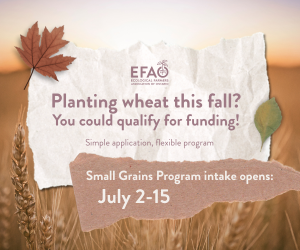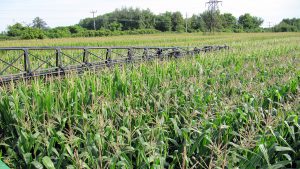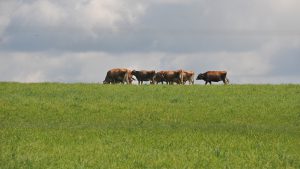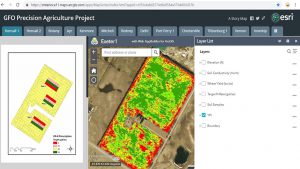Public trust
ONE CONVERSATION AT A TIME
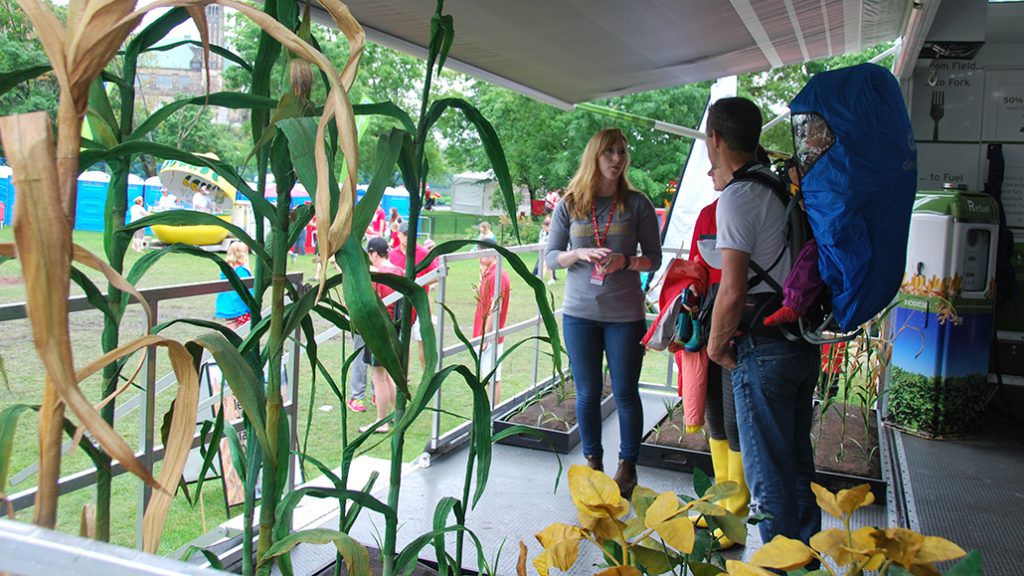
AGRICULTURE WANTS THE public to trust in its practices, to support how it produces food, and to allow farmers to continue to do the great work they are doing without constant scrutiny. When people talk about building this trust, they will often say: “We need farmers to tell their stories,” and while this is a larger conversation on building a story, how to tell a story, and where and when to tell a story, it also leads to a discussion on how to communicate with the public in general.
Grain Farmers of Ontario often provides opportunities farmer-members to come to public-facing events and talk to people about farming practices in Ontario and the safe, smart, healthy, delicious food they are producing. This puts farmer-members directly in the line of fire for some pretty hard-hitting questions. And these questions are often informed by mis-information, fear, passion, or even obstinate opinions.
Despite the tone and sometimes utter false premises of the questions, Grain Farmers of Ontario understands how important it is to engage in deeper conversations that will help the public ask better questions of the information they are seeing out there in the wild and have better information to share in their own conversations with friends, families, and peers.
It may sometimes feel that there is a never-ending series of issues impacting agriculture that are covered in the mainstream media without enough critical thinking applied, but many of them roll into a few topics: Pesticides (Organics vs Eco-Modern); and specifically glyphosate, and GMOs. Regardless of the topic, when you are public-facing, it is good to remember to enter each conversation with this in mind: Honesty, Asking, Understanding, Listening (HAUL).
As much as there is good science to back up farming practices, good data to show that food is safe, good information available on the science behind agriculture, and a passionate belief in taking care of the land and feeding other people, the other person in the conversation may well have a deep belief in their side too. It may very well be an ill-informed belief, but generally, it is a passionate belief because it’s about their personal health, their children’s health, and the food they eat. People hear about health scares and they want a villain that they can quickly name and point a finger at, and nowadays that villain is often their food.
So, can farmers have good, impactful conversations with the public? Of course. Many have them every day. It’s easy to find the negative stories, but there are some good ones too.
ENTERING THE CONVERSATION
It is not easy to take a deep breath and listen while someone shares an opinion that is based on falsehoods or conjecture, but one of the best ways to have a conversation is to allow the other person to speak. Regardless of the issue someone is addressing, having the right conversation tools will let the conversation be more engaged and more impactful.
Remembering HAUL helps.
Honesty — it’s not always easy to be completely honest, but it truly is the best policy. If someone is accusing another person of harmful practices, admitting that there is some truth to what they are saying will often help them start listening. Honesty is one gateway to a better conversation, and increases the chance that the other person will believe you and what you are saying. If someone flat out refused to acknowledge that there are some negative truths in their side of the argument, would anyone believe anything else they had to say?
Asking — As important as it is to listen, questions are another key tool in engaging in impactful conversations. How did someone come to believe what they believe? Where did they hear that information? It’s easy to be dismissive of others if they are overzealous in their beliefs, but asking them about those beliefs, without challenging those beliefs, is a gateway to talk about other opinions and sides to the issue.
Understanding — this might be the toughest conversation piece of all. What drove the other person to believe what they do? Typically with agricultural issues, people are entering into the conversation confused, afraid, and/or passionate. They might be genuinely afraid that the food they are feeding their children is in some way harmful. They might be extremely confused by all the information they are seeing from both sides of any given issue. They might want the world to be a better place and are very passionate in their beliefs on how to make that happen. There may be a few people entering into a conversation with malicious intent, but there are many, many more who are concerned and confused, and what they need is the truth and to be heard. Up until the point where they enter a conversation, it is quite possible they have only seen one side’s information and their trusted source could be their best friend.
Listening — As mentioned, it is difficult to be an active listener when you hear someone speaking about issues and they have the wrong information. But they believe it, and it is better to listen and hear everything they have to say, than to interrupt and have them feel like their opinion isn’t valuable. Take in what they are saying and be empathic to how they came to these beliefs. Listening might also reveal how they came to be misinformed as well.
PESTICIDES
It is actually ok to have trace amounts of pesticides in food, and science backs that up, but it is hard for some people, especially parents, to accept. Science is on agriculture’s side, but the words themselves are not.
The main pesticide issue right now is glyphosate. When engaging in discussions around glyphosate it is important to be honest — Yes, there are trace amounts in some foods, but it is completely safe. As important as data and science are, and agriculture must have good science and data backing up their side of the issues, these are very emotional issues, so you need to lead with honesty and empathy.
Talk about how you deal with this issue, “I can tell you that my family still eats cereal. There is no health concern there.” Use anecdotes: “Did you know that at the highest reported traces an adult would have to eat 54 bowls of oat cereal per hour, every hour without sleep, for life to even hit the minimum amount that Health Canada data says is ok? The minimum!”
If there are food-impacting diseases that pesticides help prevent, mention those. Explaining the general benefits of pesticides (and how more modern use of them actually allows farmers to use less and be more targeted) helps. Avoid using too much scientific jargon as this can derail a conversation or further confuse or belittle the listener. Remember a lot of the time people are embarrassed by their ignorance, and humiliating them more will not end in a positive conversation.
There are two common misconceptions about pesticide use: That farmers use more than ever; and that organic farming does not use pesticides. It is important to hear people out as they talk about what they have read and how they came by their information.
A realistic conversation here might include the idea that a farmer wants to be very careful about her application because she has to buy the pesticides and they are expensive, so she does what she can to use less, not more. It’s also a good point for conversation that the more modern pesticides are not just more targeted, but also less harmful to the applicator and to wildlife.
There is also great conversation to have around the idea that farmers are business people and business is about supply and demand. How many worms are people ok with in their apples? They typically say zero — so, we can point that out and show that the demand from the consumer is telling us what our practices need to be in order to operate viable businesses.
Do organic farms use pesticides? Unless you are an organic farmer talking about your own practice, it is best to inform people that each farmer in Ontario makes their own choice about insect, weed, and disease management, but there are several organic certified pesticides that farmers can choose to use.
The one point that helps in the organic or modern farming conversation is to note that all farming in Ontario and Canada is highly regulated and no matter which foods they choose to eat and feed their families, if it’s grown in Canada, it’s safe and good. Agriculture faces a lot of criticism and uphill battles and conversations with the public need to be more about supporting the work everyone is doing. A friendlier conversation like the one above will have greater positive impact.
But what about the bees? Neonicotinoids are brought up frequently in pesticide discussions and this is one case where people just want to be part of doing something positive. Inform them factually about the Pest Management Regulatory Agency’s decision and that there are reviews and consultations ongoing, and then talk to them about how they can help pollinators with personal gardens, and talk about climate change. If the conversation goes deeper, it is an opportunity to talk about the benefits of neonicotinoids to the farmer, and how in the last few years the application techniques have evolved and are much better for the bee population.
GMOS
Has there ever been an issue as contentious as GMOs? Possibly; but this is one that people feel particularly passionate about. It’s good to understand why people are anti-GMO. Is it fear? Have they just heard that they are generally bad? What do they know about GMOs?
Admit to them that this is a vast and quite complicated topic with a lot of information floating around on both sides. Sometimes it helps to start with medical GMOs and the development of insulin, and how that type of gene modification led to modern GMOs and how they can help feed the world and bring needed nutrients to those who are living without them right now.
Lead with the emotional, the personal. Make it about choices that help the world. They will mention Roundup-ready seeds, fish DNA, and more. Ask what they know about these — let them share their understanding and their fear. Then if you can, and if they will listen, talk to them about how the seeds were cultivated using natural genes and that they allow for less, more targeted use of herbicides. Talk to them about traits and genes as building blocks for agri-science.
BUT WHAT ABOUT PEOPLE YOU JUST CAN’T REASON WITH?
Yes, there are still people who will not listen to reason, who are not interested in actual conversation. And it’s ok to realize that there is no way to really engage with them and that you might be wasting your time. In those cases, a friendly smile, friendly responses, and pointing out resources that will help them learn more may not do much for that conversation, but to anyone else listening, you sound reasonable, sincere, and engaging.
There is no sure fire way to have a conversation that will change minds, but if farmers know anything, it’s that cultivation takes time. Plant some seeds, keep nurturing them.
Grain Farmers of Ontario tries to have literature and facts to support all conversations and works to find opportunities to engage with public and have these important conversations.
Victoria Berry is manager of communications for Grain Farmers of Ontario. •
WHERE SHOULD GRAIN FARMERS OF ONTARIO FARMER-MEMBERS GO TO GET GOOD DATA?
There are several organizations that have data readily available for farmers to use:
• Grain Farmers of Ontario www.gfo.ca
• Bayer AG www.cropscience.bayer.ca
• Cereals Canada https://cerealscanada.ca/
• CropLife https://croplife.ca/
• Farm & Food Care www.farmfoodcareon.org/
• Centre for Food Integrity www.foodintegrity.org/
• Health Canada www.canada.ca/en/health-canada.html
REDIRECTING THE CONVERSATION
HOW DO YOU MOVE FROM QUESTIONS TO YOUR STORY?
There are a number of phrases you can use to get a conversation back on track naturally.
• The most important thing is…
• I’ve found what people are really interested in is….
• Let’s take a step back and put this into context…
• Another way to look at this issue is…
• I’ll let others speak to that, but what I do know is… •


